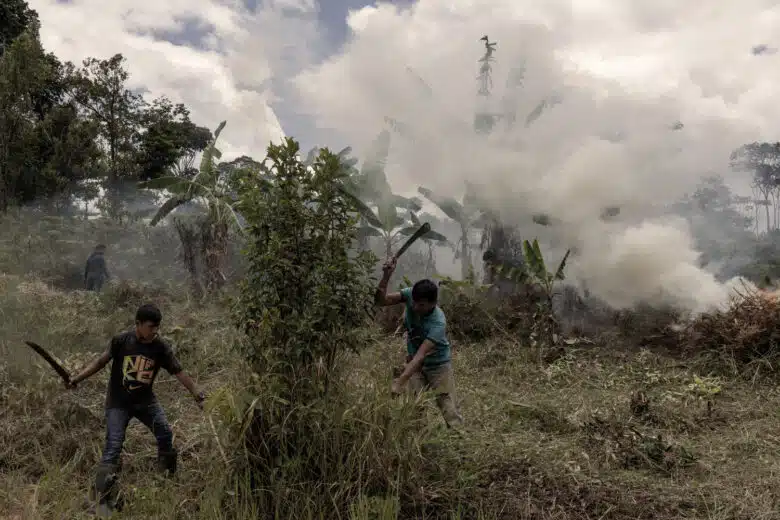Residents of the Indigenous Pemón village of Wuruupo use controlled burns to clear land for a new “conuco,” or small subsistence farm, near the village, which is in Venezuela’s southeastern Gran Sabana region. Fire is an important tool for the Pemón, who use it not only to clear the land and prepare the soil for agriculture but also to communicate over long distances. The Pemón live scattered across the Gran Sabana, a region the size of Belgium that is designated as a national park, in dozens of small villages, some of them very remote. Unemployment and a chronic lack of even basic services plague the Indigenous communities of the Gran Sabana, pushing some residents to leave their lands or resort to illegal wildcat mining, which has devastating health and environmental effects. The villagers in Wuruupo have taken the explicit decision not to allow mining on their lands and rely, instead, on their “conucos,” where they grow yucca and other crops that are the staples of their diets. UNHCR works with many of these vulnerable Indigenous communities, such as Wuruupo, to help prevent displacement. The UN Refugee Agency has provided staple foods, as well as basic items, such as solar-powered lamps, that improve residents’ quality of life and allow people to remain on their ancestral lands. ; UNHCR works within Venezuela to provide support to refugees inside the South American country, as well as with vulnerable Venezuelan populations at risk of displacement, and also with those returning to the country from abroad.
Latest News
Areas of interest
#WithRefugees
Afghanistan
Asylum Seekers
Bangladesh
Canada
CAR
central america
Children
Climate Change
Coronavirus
COVID
COVID-19
COVID19
Displaced
Displacement
DRC
Education
Emergency Response
Ethiopia
Filippo Grandi
IOM
Iraq
Kenya
Libya
Mediterranean
Myanmar
novel coronavirus
Rebuilding Lives
Refugee
refugees
Resettlement
Rohingya
South Sudan
Statelessness
sudan
Syria
Ukraine
unhcr
UNHCR Canada
UN High Commissioner for Refugees
Venezuela
Violence
Winter
Yemen
Youth
Popular News Stories
- The Whatsapp Wedding
- Refugee voices: Inspiring stories of young refugees in Canada
- Persecution and perseverance: Survival stories from the Hazara community
- IOC Refugee Olympic Team to represent more than 100 million displaced people at the Olympic Games Paris 2024
- Fighting for her dreams: female Afghan judoka builds a new life in Canada
- How to help newly arrived refugees in your community
Recent News Posts
- Grave concern over civilians cut off from life-saving aid in Sudan
- IOC Refugee Olympic Team to represent more than 100 million displaced people at the Olympic Games Paris 2024
- Rohingya refugees risk dangerous sea route to Indonesia in search of safety and freedom
- UNHCR launches fund to shield refugees and other displaced people from climate shocks
- UNHCR wins prestigious Webby Award for YouTube series challenging perceptions about refugees



